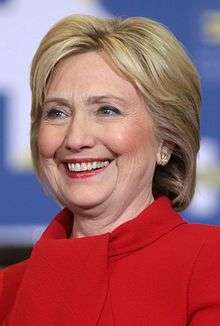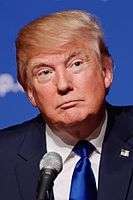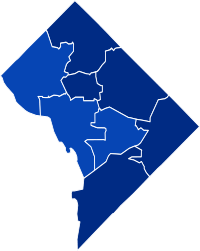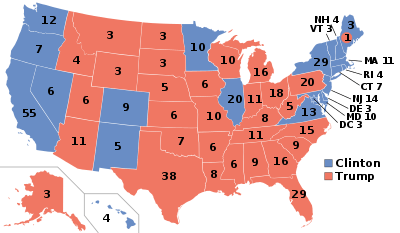United States presidential election in the District of Columbia, 2016
| | ||||||||||||||||||||||||||||||||
| ||||||||||||||||||||||||||||||||
| ||||||||||||||||||||||||||||||||
|
| ||||||||||||||||||||||||||||||||
| District of Columbia results by ward
Clinton—>90%
Clinton—80-90% | ||||||||||||||||||||||||||||||||
| ||||||||||||||||||||||||||||||||
| Elections in Washington, D.C. |
|---|
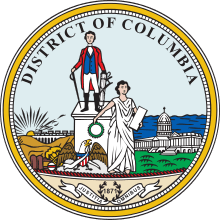 |
|
|
The 2016 United States presidential election in the District of Columbia was held on November 8, 2016, as part of the 2016 General Election in which all 50 states plus The District of Columbia participated. D.C. voters chose electors to represent them in the Electoral College via a popular vote pitting the Republican Party's nominee, businessman Donald Trump, and running mate Indiana Governor Mike Pence against Democratic Party nominee, former Secretary of State Hillary Clinton and her running mate, Virginia Senator Tim Kaine.
On March 12 and June 14, 2016, voters chose delegates to the Republican and Democratic National Conventions respectively.
Clinton won the election with 282,830 votes or 90.9%, the third strongest win for a Democrat after Barack Obama's victories in 2008 and 2012. Donald Trump's 12,723 votes or 4.1% is the lowest count and percentage that a Republican has received in the District.[1] The District of Columbia has voted for the Democratic ticket in every election since 1964, which was the first election in which D.C. voters were allowed to participate.
Background
The incumbent President of the United States, Barack Obama, a Democrat and former U.S. Senator from Illinois, was first elected president in the 2008 election, running with former Senator Joe Biden of Delaware. Defeating the Republican nominee, Senator John McCain of Arizona, with 52.9% of the popular vote and 68% of the electoral vote,[2][3] Obama succeeded two-term Republican President George W. Bush, the former Governor of Texas. Obama and Biden were reelected in the 2012 presidential election, defeating former Massachusetts Governor Mitt Romney with 51.1% of the popular vote and 61.7% of electoral votes.[4] Although Barack Obama's approval rating in the RealClearPolitics poll tracking average remained between 40 and 50 percent for most of his second term, it has experienced a surge in early 2016 and reached its highest point since 2012 during June of that year.[5][6] Analyst Nate Cohn has noted that a strong approval rating for President Obama would equate to a strong performance for the Democratic candidate, and vice versa.[7]
Following his second term, President Obama is not eligible for another reelection. In October 2015, Obama's running-mate and two-term Vice President Biden decided not to enter the race for the Democratic Presidential nomination either.[8] With their term expiring on January 20, 2017, the electorate is asked to elect a new president, the 45th President and 48th Vice President of the United States, respectively.
Political landscape in the District of Columbia
The Twenty-third Amendment to the United States Constitution, ratified in 1961, grants the District of Columbia the right to choose presidential electors equal to the number from the least populous state (currently Wyoming's three). Since the amendment's ratification, the District of Columbia has cast its electoral votes for the Democratic candidate in every election. A Republican has never been the District's Mayor, and the current Council has 10 Democrats and 2 Independents.
Primary Elections
Republican convention
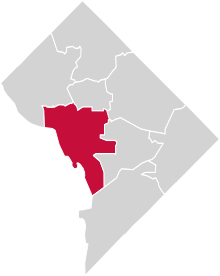
Due to the small geographical size of the District of Columbia and the very small number of Republicans in the District, the local Republican party decided go directly to a "state convention", which took place at the Loews Madison Hotel at 1177 15th St NW from 10 a.m. - 4 p.m. The Convention/Caucus method was chosen because the June 14th primary was deemed too late, and DC would be penalized and only get 16 delegates.[9]
| District of Columbia Republican presidential convention, March 12, 2016 | |||||
|---|---|---|---|---|---|
| Candidate | Votes | Percentage | Actual delegate count | ||
| Bound | Unbound | Total | |||
| 1,059 | 37.3% | 10 | 0 | 10 | |
| John Kasich | 1,009 | 35.54% | 9 | 0 | 9 |
| Donald Trump | 391 | 13.77% | 0 | 0 | 0 |
| Ted Cruz | 351 | 12.36% | 0 | 0 | 0 |
| Jeb Bush (withdrawn) | 14 | 0.49% | 0 | 0 | 0 |
| Rand Paul (withdrawn) | 12 | 0.42% | 0 | 0 | 0 |
| Ben Carson (withdrawn) | 3 | 0.11% | 0 | 0 | 0 |
| Unprojected delegates: | 0 | 0 | 0 | ||
| Total: | 2,839 | 100% | 19 | 0 | 19 |
| Source: The Green Papers | |||||
Democratic primary
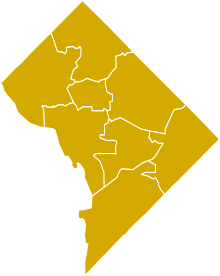
The Democratic primary was held June 14. The date was chosen because it was thought that by then the race would be over and the voters could then concentrate on local races.
Results
| Candidate | Popular vote | Estimated delegates | |||
|---|---|---|---|---|---|
| Count | Percentage | Pledged | Unpledged | Total | |
| Hillary Clinton | 76,704 | 77.95% | 16 | 23 | 39 |
| Bernie Sanders | 20,361 | 20.69% | 4 | 2 | 6 |
| "Rocky" Roque De La Fuente | 213 | 0.22% | |||
| Under Votes | 611 | 0.62% | |||
| Write-In | 485 | 0.49% | |||
| Over Votes | 24 | 0.02% | |||
| Uncommitted | N/A | 0 | 0 | 0 | |
| Total | 98,398 | 100% | 20 | 25 | 45 |
| Source: The Green Papers, District of Columbia Board of Elections - Official Primary Results | |||||
Results By Ward
| County [10] | Clinton | Votes | Sanders | Votes |
|---|---|---|---|---|
| Ward 1 | 73.8% | 9,893 | 25.3% | 3,181 |
| Ward 2 | 79.6% | 7,294 | 19.4% | 1,777 |
| Ward 3 | 77.1% | 10,893 | 21.8% | 3,087 |
| Ward 4 | 77.9% | 12,863 | 20.7% | 3,421 |
| Ward 5 | 78.2% | 9,214 | 20.5% | 2,419 |
| Ward 6 | 77.9% | 11,898 | 20.9% | 3,198 |
| Ward 7 | 82.1% | 8,657 | 16.2% | 1,707 |
| Ward 8 | 78.6% | 6,612 | 18.7% | 1,571 |
| Total | 78.0% | 76,704 | 20.7% | 20,361 |
Ballot controversy
On March 30, ten weeks ahead of the Washington D.C. primary, NBC affiliate News 4 reported that the Democratic Party's D.C. State Committee had submitted registration paperwork for listing presidential candidate Bernie Sanders on the primary ballots a day late, even though the Sanders campaign had correctly and timely registered with the state party. After a voter filed a challenge, this would possibly lead to Sanders' name missing on the ballots,[11] As the D.C. Council announced it would hold an emergency vote to put Sanders back on the ballots,[12] and with Clinton's campaign chairman John Podesta asking to make sure an administrative error wouldn't exclude a candidate, D.C. Democratic Party chairwoman Anita Bonds told CNN that "Bernie will be on the ballot." She further explained that the party has always notified the D.C. board of elections a day after the deadline, with the only difference being that this time, someone challenged the inclusion of Sanders.[13]
Results
| Candidate | Popular vote | Percentage | |||
|---|---|---|---|---|---|
| Hillary Clinton | |||||
| Donald Trump | |||||
| Gary Johnson | |||||
| Jill Stein | |||||
| Roque De La Fuente | |||||
| Write-in | 0.00% | ||||
| Total | 100% | ||||
| Source: California Secretary of State - Presidential Primary Election Statement of Votes The Green Papers | |||||
Hillary Clinton 92.85% Donald Trump 4.12% Gary Johnson 1.61% Jill Stein 1.43%
See also
- Democratic Party presidential debates, 2016
- Democratic Party presidential primaries, 2016
- Republican Party presidential debates, 2016
- Republican Party presidential primaries, 2016
References
- ↑ "General Election 2016 - Unofficial Results". Retrieved November 10, 2016.
- ↑ "United States House of Representatives floor summary for Jan 8, 2009". Clerk.house.gov. Retrieved January 30, 2009.
- ↑ "Federal elections 2008" (PDF). Federal Election Commission. Retrieved May 11, 2015.
- ↑ "President Map". The New York Times. November 29, 2012. Retrieved May 11, 2015.
- ↑ "Election Other – President Obama Job Approval". RealClearPolitics. Retrieved December 24, 2015.
- ↑ Byrnes, Jesse (2016-06-15). "Poll: Obama approval rating highest since 2012". TheHill. Retrieved 2016-06-19.
- ↑ Cohn, Nate (2015-01-19). "What a Rise in Obama's Approval Rating Means for 2016". The New York Times. ISSN 0362-4331. Retrieved 2016-06-19.
- ↑ "Joe Biden Decides Not to Enter Presidential Race". The Wall Street Journal. Retrieved October 21, 2015.
- ↑ http://dcist.com/2016/03/_dc_republicans_who_account.php
- ↑ http://democratas2016.ceepur.org/
- ↑ Tom Sherwood (March 30, 2016). "Bernie Sanders May Be Off DC Ballot After Democratic Party Filing". NBC 4 Washington. Retrieved April 1, 2016.
- ↑ Tom Sherwood (March 31, 2016). "DC to Hold Emergency Vote to Get Bernie Sanders on Democratic Primary Ballot". NBC 4 Washington. Retrieved April 1, 2016.
- ↑ Tom LoBlanco (March 31, 2016). "Sanders likely on D.C. ballot despite challenge". CNN. Retrieved April 1, 2016.
